#salt economics
Text
the field meets the wood by astronicht

the field meets the wood
by astronicht
T, 7k, wangxian
Summary: Wei Wuxian is a dark shadow in the barley. Wei Wuxian is sorry for the kind of compassion that he is about to hand out.
(in which Lan Wangji is stolen for salt, and Wei Wuxian unravels the world, a little)
Mojo's comments: Whoa. lwj is kidnapped after being struck with a wasting curse, and wwx goes yiling laozu on the salt merchants who took and hurt him. He's hurt and dripping blood the whole time, yet still manages to have a philosophical discussion about the universe and meaning of nothing before laying down a metaphysical retribution that nearly kills him. It's delicious.
The writing is simply beautiful, which is a funny thing to say about a story that evokes such visceral horror.
Excerpt: “Correctly done, your ritual probably would not kill a cultivator,” Wei Wuxian allows. His voice is very cold, very academic. He sounds like Wen Qing, as well he should. He cut his teeth in the finer depths of demonic cultivation first at his shijie’s kitchen table after the war, then at Wen Qing’s elbow. He feels like a creation of the dead women he has known — Madam Yu, shijie, Wen Qing, all of their aborted scorn, their recalled injuries, the way even shijie’s eyes could sometimes look like two dry river stones.
Lan Wangji, there on the floor, once had a mother who was kept locked away. Perhaps her qi was bound with a curse like this one; perhaps Lan Wangji has been used before now as a different sort of hostage. Wei Wuxian will try to do right by her. Wei Wuxian would have wanted her as a mother-in-law even if she were as formidable as Madam Yu.
bamf wei wuxian, slight whump, ritualistic self-harm, canon era, tang dynasty style, blood loss, blood and injury, salt economics, post-canon, podfic available, horror, pov wei wuxian, kidnapped lan wangji, established relationship, yiling laozu wei wuxian, curses, happy ending
~*~
(Please REBLOG as a signal boost for this hard-working author if you like – or think others might like – this story.)
#Wangxian Fic Rec#The Untamed#wangxian#MDZS#Mojo's Rec#bamf wei wuxian#slight whump#ritualistic self-harm#canon era#tang dynasty style#blood loss#blood and injury#salt economics#post-canon#podfic available#horror#pov wei wuxian#kidnapped lan wangji#established relationship#yiling laozu wei wuxian#curses#happy ending#short fic <15k#teen#the field meets the wood#astronicht
84 notes
·
View notes
Text
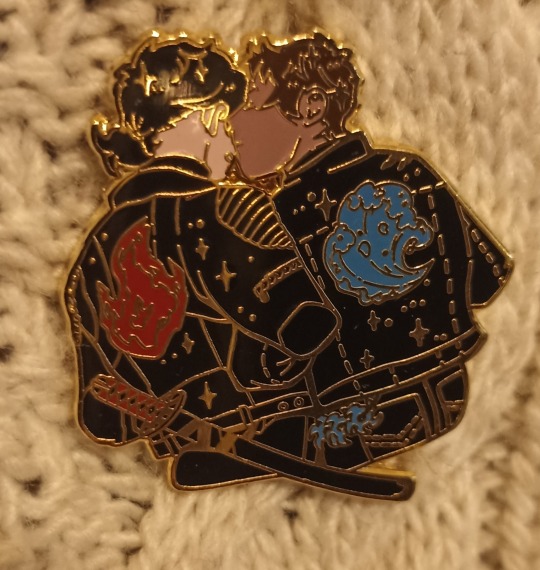
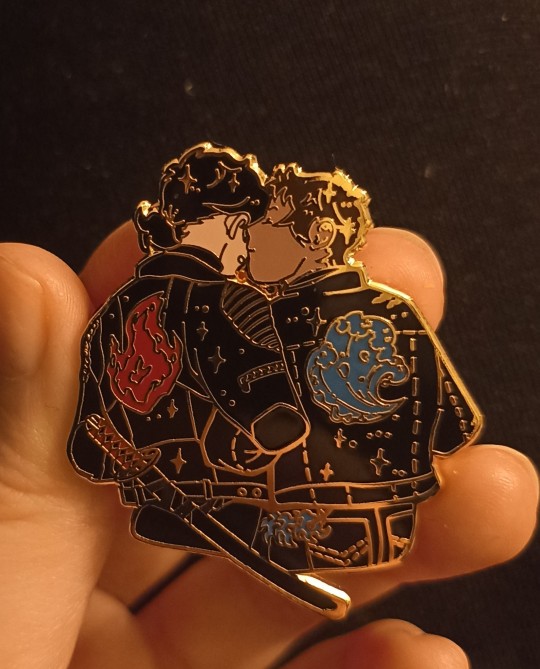
Samurai and Ninja in crappy pics because December here is under a constant cloud and I just want y'all to see them all golden and cute without learning how to take aesthetic pictures 🥴 💙❤️😆🥰
linktr.ee/Mezzy
#klance#can i tell everyone to look away before i write tags to someone privately lmao no? damn#anyway yes i meant music!! and thank you for sharing something!!#baking seems like a hyperfixation#like i know you said you baked once but then look at me#...i was thinking if i could make salads.... i gotta be medicore at least at one food thing#its a joke its a joke#i will one day get used to focusing on more complicated kitchen work than heating up meat or cooking things in salt and water#anyone else had trouble getting out of bed this december?#once i do i try to pick physical activities that dont require creative thinking because man#at the post office i had small talk with a lady waiting in line she didnt speak polish so u know me it happened#and she recommended light therapy lamp#im very tempted to try it becase i had record bad thoughts sleepless nights and jerking awake this month#it might be rooted in economic instability growing inflation costs of living and shitty working conditions while still trying to buy gifts?#but hey there are things we cant have control over and there are things we can#ive got winter wonderland comic coming though#i will try my best to speed-finish it as a christmas gift aight#i hope its going to be a nice thing!!#wow thats a long set of tags
321 notes
·
View notes
Note
AU ask: Satine Lives
send me an au and i’ll give you 5+ headcanons about it
I think she deserves a cool facial scar. As a treat.
Running with the Rebellion. She's too powerful a symbol to be allowed to take her seat as Duchess back, especially if she decides to work with Bo-Katan; pacifism may be incredibly important to her, but there is a limit to how far you can push someone before they engage in self-defense, and even as ardent a pacifist as Satine will rally her people to survive the Empire. With her and Bo working together, they can do a lot... and that's why the Empire will absolutely not allow either of them to become leader of Mandalore again. (So it goes to Korkie, who the Empire believes is little more than a puppet. They think they know about his little violations of the law, and so they miss the big ones, like smuggling force-sensitive children and O66-survivors away from the Empire.)
She doesn't know Obi-Wan is alive, because Bail forgot to get permission to tell her, until 10 years post-RotS... when Bail invites her to greet "Ben" and Leia on their return to safety on Alderaan. She promises to visit him, if there's a chance.
(She doesn't. Instead, he visits her. Satine is far more likely to be tracked to Tatooine than he is, after all.)
She still doesn't pick up a blaster, though; canon gives us some pretty solid evidence for her PTSD preventing her from being any use at it. However, she's very convincing and is very good at getting on-the-fence politicians on the Rebellion's side... and donating credits, rations, and transports to the cause. (Some even donate weapons. She... tries to ignore that part. She lets it happen, but... it hurts.)
#satine kryze#I genuinely believe she would hit her breaking point if the Empire took Mandalore#Part of the issue with involving Mandalore in the Clone War was that they were still recovering and too weak economically#and in other ways to even consider joining a war that hadn't touched them yet#part of it was overall pacifism and part of it was not being told about the CIS war crimes and so not KNOWING why diplomacy wouldn't work#but part of it was also just that they Could Not Afford It; a half-dead mid rim planet had so much more to risk than like. Alderaan#But if the war and horrors came to Mandalore's doorstep and started breaking the people down and salting what little earth was left...#what choice is there if they want to survive? They couldn't join TCW because it would kill what was left of them.#They couldn't NOT join the war on the Empire because it was already killing what was left of them#star wars#phoenix answers memes
144 notes
·
View notes
Text
The "Valicer In The Dark Meets Baldur's Gate III" Not-Incorrect Quotes/Shitpost Collection
(Don't worry too much about spoilers -- most of this is early-game stuff, with just a couple of things relating to stuff in Act II)
--
Alice: [having just met Lae'zel on the Nautiloid and been informed of the situation with the parasites] And who are you, exactly?
Lae'zel: Who am I? Your only chance of survival.
[later, after the imps have been fought, and everyone's met back up and freed Shadowheart:]
Victor: [introducing himself as they get back on the move] I'm Victor.
Alice: I'm Alice. [pointing to Lae'zel] And this is Only.
Lae'zel: ?
Alice: Well, you've given me nothing else to call you.
--
Shadowheart: [after being informed the trio live in a world without a sun and that's why they're being so weird about the sky being blue] I -- are you Shar's Chosen? Is this some sort of test? Am I not supposed to believe you when you say you like sunlight? I can totally not believe you if that's the case!
Alice: ...I feel like we've missed something.
Smiler: [lying down and sunbathing] Yeah, it's in the sky above us.
--
Withers: What is the worth of a single mortal's life?
Victor: I -- I would say priceless. You can't put a value on life itself.
Alice: I say it's worth whatever you're willing to pay to defend it. Only the owner of said life can set the value.
Smiler: I'm pretty sure the standard rate of assassins in Duskwall is four Coin minimum -- not sure how that translates to your money.
Victor & Alice: [look at Smiler]
Smiler: What? It's a legitimate answer!
--
Withers: I shall be here, in thy camp, for whenever thou has need of my services.
Alice: Oh? What kind of services do you offer?
Withers: A mending of the threads between life and death. Should thou or any of thy compatriots perish, I will cleave soul to body once more.
Victor: Cleave soul to -- wait a minute, isn't that how you get vampires?
Astarion: [rearranging his tent, pauses and gives them a really weird look]
--
Alice: [during one of the meetings with Raphael] You do seem like a very powerful devil.
Raphael: [preening] I consider myself no slouch, yes.
Smiler: [cheerfully] I bet your blood could power an entire city block for a month!
Raphael: [blink blink] ...thank...you?
--
Strange Ox: Ah, you're addressing me. A humble ox. How...quaint.
Smiler: [tilting their head] What are you?
Strange Ox: As I said, a humble ox. I don't know why you're --
Smiler: No, I mean, what's an ox?
Strange Ox: ...
--
Smiler: [standing behind a table lined with eight samples of the same Potion Of Glorious Vaulting, with Victor, Alice, and the companions all gathered around the front of it] Thank you all for coming to this blind taste test, where we will be disproving the idiotic notion that you only need one specific ingredient per potion to create something that does what you want it to. In front of you are eight individual Potions of Glorious Vaulting, each made with a different type of Ashes -- I would like you each to drink one, test the effects, then rate it based on how strong the effects were, how long they lasted, and how tasty it was.
Wyll: You care about the taste?
Smiler: Of course! If we're going to be making potions, the least we could do is make them pleasant to consume! We're working toward maximum happiness here! Now everybody pick one and let's get jumping!
--
Gale: [realizing the trio isn't with them as they move through the mind flayer colony under Moonrise] Hold -- where's Victor, Alice, and Smiler?
Karlach: I think I saw them looking at a cage in the last room.
Lae'zel: Chk -- they should know by now that we cannot pause and look at every little thing that --
Smiler: [rejoining the group carrying a certain intellect devourer, beaming, as Victor and Alice come up behind them] Hey everyone!
Lae'zel: [stares at the brain] ...
Astarion: Why are you carrying an intellect --
Lae'zel: THAT. THING. SURVIVED?!
Us: Hello Angry Friend!
Lae'zel: I'M NOT YOUR FRIEND
--
Aylin: [after everyone's agreed to meet up with her and Isobel again later at the camp] Now -- you will leave us. We must take succour in one another's bodies and words.
Isobel: Aylin. We'll see you later.
Victor: [hiding a smile] Of course.
Alice: [biting back a chuckle] Later.
Smiler: [big beaming grin and a double thumbs up] Enjoy the hot lesbian sex!
Victor: Smiler!
Aylin: I intend to.
Isobel: AYLIN.
#valicer in the dark au#baldur's gate 3#bg3#bg3 spoilers#(very minor ones nothing for Act III but I guess there's a little bit for Act II here)#not incorrect quotes#had probably more fun with these than I should have#Lae'zel cracks and tells Alice her name when she tells 'Only' and Shadowheart not to fight before they reach the helm#Alice of courses persists in calling her 'Only' when she's annoyed with her#and Smiler is like 'VINDICATED' when Withers admits that resurrecting people is a matter of coin#'see I told you he might want the economics answer!'#also yes ghosts possessing soulless bodies is how you get vampires in Duskwall#not to mention most of them suck life straight out of other people#a blood-drinker like Astarion is unusual there#as for the 'blood could power a city block'#most of the electroplasmic power that helps light up Duskwall comes from leviathan blood#and leviathans are a large form of devil#so it really was meant as a compliment XD#and yes I looked at how alchemy worked in the game#and Smiler was immediately like 'what do you mean ANY SALT'#they take their craft seriously damn it XD#and also you should be allowed to hug Us#put that in the next patch Larian#queued
6 notes
·
View notes
Text
Had some thoughts about Gotham city recently after jokingly comparing it to Detroit. But like… it got me thinking. What if the crime rates in Gotham are so high because it used to be a bustling city with a crazy economy and good job market but it was all reliant on a couple companies that went bankrupt years prior? So now there are all these people without jobs who had to turn to crime to get by. Of course Wayne enterprises kinda screws this up in theory, but if you think about it as WE is fairly new to the scene and only started to get massive since Bruce took over, it kinda works? I have always blamed the kooky villains like joker and scarecrow on Batman’s existence so factoring them out it’s not totally unreasonable to think that Gotham’s high crime rates are due to an economy collapse that the city and their ever growing population are struggling to get out of.
#Cause god knows the gouvernement (why is that French?) wouldn’t help a city of mostly poor disenfranchised people#and if most of the city officials are corrupt cause money and lots of organized crime… well it’s kind of a recipe for disaster#of course these are solely based on my very rudementary knowledge of business and crime rates and the economy#so take it with enough salt to send you into cardiac arrest lmao#just#i feel like the way Gotham is portrayed as this horrible awful city that almost has a life of its own#with no cause other than literally magic#Is really silly especially since there are actually places with high crime rates and reasons for those crime rates#add Batman into the mix and it’s not like there wouldn’t be an explanation#it’s just an explanation that doesn’t lend itself to Bruce being painted in a good light#after all if it was economic collapse a lot of gothams problems would be unemployment#and a corrupt capitalist system that wants to keep people down. cant get job cant get money cant live#and if Bruce Wayne could do something about it not Batman Bruce would be a really shitty person to keep his wealth to himself#(or he would just be your average billionaire)#and we can’t have Batman be the bad guy#comics#dick grayson#dc comics#nightwing#batman#bruce wayne#bruce wayne hate club#Gotham#Gotham city#jason todd#tim drake#robin#red hood
22 notes
·
View notes
Text
It is often said that Venice grew rich on the “spice trade.” This is true – yet that spice was not exotic cloves or cardamom, but simple salt. Aside from fish, the lagoon does not offer much in the way of foodstuffs. Throughout its long history, Venice has always had to import its food, which requires money. The earliest Venetians built saltworks that allowed lagoon water to flow during high tide into wide basins, where it was trapped and left to evaporate in the sun. They then used heavy cylinders to roll over the salt, breaking it up into pieces that could be loaded aboard boats for export. It fetched a tidy sum – crucial for the tiny, but growing, economy of early Venice, and indeed for many centuries to come. It is often said that Venetians left salt production behind when international trade and commerce became their path to riches. That is simply untrue. Medieval and Renaissance commercial documents bear strong witness to the combined importance of the salt trade. Indeed, the Venetian government established its own Salt Office, which would grow to become one of the most powerful organs of the state.
— Venice: A New History (Thomas F. Madden)
#book quotes#thomas f. madden#venice: a new history#history#food and drink#economics#commerce#trade#employment#labour#salt#italy#venice
2 notes
·
View notes
Text
I don’t often engage with FR’s lore, it just doesn’t come to mind a lot, but the tiny tiny tidbit about elementally enchanted items in the new harpy lore? Now that has me intrigued. I could see it expanded into a crafting-like game mechanic if there was an equipment system to go with it, just anything of use to put these enchantments on. It would be interesting to see what effects on the economy would come from a hypothetically element and level-locked crafting system.
#flight rising#me: considering the economic implications of a hypothetical system#also me: forgets that high-level brewing items are valuable because not everyone has maxed brewing like me#take my economy opinions with a grain of salt and maybe some sludge
15 notes
·
View notes
Text
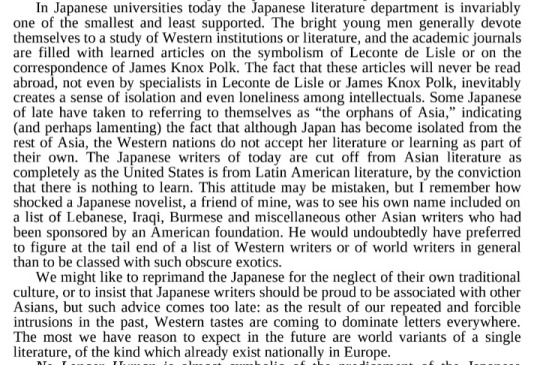
i wouldn't take this as gospel but there is a lot of truth to it
#still though this is still a western perspective so i think we could take this with many grains of salt#this also does come back to the quote on quote hierarchy that asians have#ive experienced it a lot where the developed or richer countries like south korea and japan often do consider themselves#to be better or above than countries in the southeast (vietnam n the philippines for example) just based on economical status + the status#they have in the west/internationally#again this isn't true of everyone obviously that would be a gross generalisation but it's also sadly true#if you consider common views
1 note
·
View note
Text
I'm not sure if this has been said, but I said it now...
The Dow is Capitalist Fairy Tales, and less founded in reality than The Brothers Grimm.
#armchair political commentary#economics#politics#armchair punditry#raze the capitalists then douse them in salt
0 notes
Text
ryukishi saying he still doesnt intend on furthering ciconia bc of all the current world events is so... like it was already a weak justification during covid but like. just be honest abt the silent hill money speaking louder than wtc money we would all understand!
#i intend to watch the livestream where he says this myself later when im done raiding but otherwise this is info from r/visualnovels#so take it with a massive grain of salt until u confirm this urself#but like. we all know his non WTC works are dogshit and ciconia sold poorly#so if he simply said he was pursuing the more economical interest i think many ppl would understand#not to mention ppl already have high expectations since this is the first of his works with an end already in mind. so the longer he waits#the more that expectation grows....
1 note
·
View note
Text
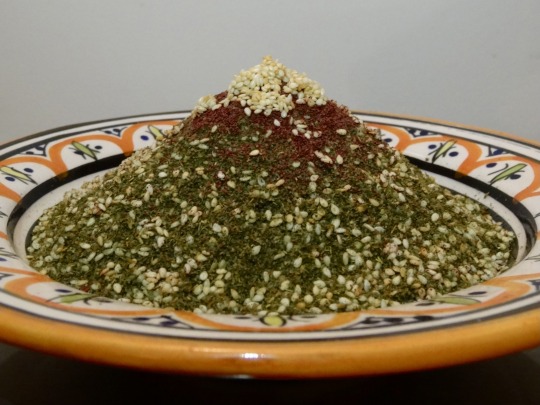
[ID: A decorative orange ceramic plate with a pyramid of green herbs and sesame seeds, topped with deep red sumac and more sesame seeds. End ID]
زعتر فلسطيني / Za'tar falastinia (Palestinian spice blend)
Za'tar (زَعْتَر; also transliterated "za'atar," "zaatar" and "zatar") is the name of a family of culinary herbs; it is also the name of a group of spice blends made by mixing these herbs with varying amounts of olive oil, sumac, salt, roasted sesame seeds, and other spices. Palestinian versions of za'tar often include caraway, aniseed, and roasted wheat alongside generous portions of sumac and sesame seeds. The resulting blend is bold, zesty, and aromatic, with a hint of floral sourness from the sumac, and notes of licorice and anise.
Za'tar is considered by Palestinians to have particular national, political, and personal importance, and exists as a symbol of both Israeli oppression and Palestinian home-making and resistance. Its major components, olive oil and wild thyme, are targeted by the settler state in large part due to their importance to ecology, identity, and trade in Palestine—settlers burn and raze Palestinian farmers' olive trees by the thousands each year. A 1977 Israeli law forbade the harvesting of wild herbs within its claimed borders, with violators of the law risking fines and confiscation, injury, and even death from shootings or land mines; in 2006, za'tar was further restricted, such that even its possession in the West Bank was met with confiscation and fines.
Despite the blanket ban on harvesting wild herbs (none of which are endangered), Arabs are the only ones to be charged and fined for the crime. Samir Naamnih calls the ban an attempt to "starve us out," given that foraging is a major source of food for many Palestinians, and that picking and selling herbs is often the sole form of income for impoverished families. Meanwhile, Israeli farmers have domesticated and farmed za'tar on expropriated Palestinian land, selling it (both the herb and the spice mixture) back to Palestinians, and later marketing it abroad as an "Israeli" blend; they thus profit from the ban on wild harvesting of the herb. This farming model, as well as the double standard regarding harvesting, refer back to an idea that Arabs are a primitive people unfit to own the land, because they did not cultivate or develop it as the settlers did (i.e., did not attempt to recreate a European landscape or European models of agriculture); colonizing and settling the land are cast as justified, and even righteous.
The importance of the ban on foraging goes beyond the economic. Raya Ziada, founder of an acroecology nonprofit based in Ramallah, noted in 2019 that "taking away access to [wild herbs] doesn't just debilitate our economy and compromise what we eat. It's symbolic." Za'tar serves variously as a symbol of Palestinians' connection to the land and to nature; of Israeli colonial dispossession and theft; of the Palestinian home ("It’s a sign of a Palestinian home that has za’tar in it"); and of resistance to the colonial regime, as many Palestinians have continued to forage herbs such as za'tar and akkoub in the decades since the 1977 ban. Resistance to oppression will continue as long as there is oppression.
Palestine Action has called for bail fund donations to aid in their storming, occupying, shutting down, and dismantling of factories and offices owned by Israeli arms manufacturer Elbit Systems. Also contact your representatives in the USA, UK, and Canada.
Ingredients:
Za'tar (Origanum syriacum), 250g once dried (about 4 cups packed)
250g (1 2/3 cup) sesame seeds
170g (3/4 cup) Levantine sumac berries, or ground sumac (Rhus coriaria)
100g (1/2 cup) wheat berries (optional)
2 Tbsp olive oil
1 Tbsp aniseed (optional)
1/2 Tbsp caraway seeds (optional)
Levantine wild thyme (also known as Bible hyssop, Syrian oregano, and Lebanese oregano) may be purchased dried online. You may also be able to find some dried at a halal grocery store, where it will be labelled "زعتر" (za'tar) and "thym," "thyme," or "oregano." Check to make sure that what you're buying is just the herb and not the prepared mixture, which is also called "زعتر." Also ensure that what you're buying is not a product of Israel.
If you don't have access to Levantine thyme, Greek or Turkish oregano are good substitutes.
Wheat berries are the wheat kernel that is ground to produce flour. They may be available sold as "wheat berries" at a speciality health foods store. They may be omitted, or replaced with pre-ground whole wheat flour.
Instructions:
1. Harvest wild thyme and remove the stems from the leaves. Wash the leaves in a large bowl of water and pat dry; leave in a single layer in the sun for four days or so, until brittle. Skip this step if using pre-dried herbs.
2. Crumble leaves by rubbing them between the palms of your hands until they are very fine. Pass through a sieve or flour sifter into a large bowl, re-crumbling any leaves that are too coarse to get through.
Crumbling between the hands is an older method. You may also use a blender or food processor to grind the leaves.
3. Mix the sifted thyme with a drizzle of olive oil and work it between your hands until incorporated.
4. Briefly toast sumac berries, caraway seeds, and aniseed in a dry skillet over medium heat, then grind them to a fine powder in a mortar and pestle or a spice mill.
5. Toast sesame seeds in a dry skillet over medium heat, stirring constantly, until deeply golden brown.
6. (Optional) In a dry skillet on medium-low, toast wheat berries, stirring constantly, until they are deeply golden brown. Grind to a fine powder in a spice mill. If using ground flour, toast on low, stirring constantly, until browned.

Some people in the Levant bring their wheat to a local mill to be ground after toasting, as it produces a finer and more consistent texture.
7. Mix all ingredients together and work between your hands to incorporate.
Store za'tar in an airtight jar at room temperature. Mix with olive oil and use as a dipping sauce with bread.
2K notes
·
View notes
Text
Look, I agree a lot of military history nerds can be annoying snobs.
But you lot have your share of ‘social history’ snobs as well. Ya’ll aren’t any better.
#Whereas I sit here specifically on my intersection of political#and military history and how specific turningpoints happen#History#Musings#And with a sideline in the economics and pol#politics of certain commodoty history because apparently the history of salt is a fascinating subject#no seriously read Salt by Mark Kurlansky#It's great
0 notes
Text
Massacre is a dead metaphor that is eating my friends, eating them without salt. They were poets and have become Reporters With Borders; they were already tired and now they're even more tired. 'They cross the bridge at daybreak fleet of foot' and die with no phone coverage. I see them through night vision goggles and follow the heat of their bodies in the darkness; there they are, fleeing from it even as they run towards it, surrendering to this huge massage. Massacre is their true mother, while genocide is no more than a classical poem written by intellectual pensioned-off generals. Genocide isn't appropriate for my friends, as it's an organised collective action and organised collective actions remind them of the Left that let them down.
Massacre wakes up early, bathes my friends in cold water and blood, washes their underclothes and makes them bread and tea, then teaches them a little about the hunt. Massacre is more compassionate to my friends than the Universal Declaration of Human Rights. Massacre opened the door to them when other doors were closed, and called them by their names when news reports were looking for numbers. Massacre is the only one to grant them asylum regardless of their backgrounds; their economic circumstances don't bother Massacre, nor does Massacre care whether they are intellectuals or poets, Massacre looks at things from a neutral angle; Massacre has the same dead features as them, the same names as their widowed wives, passes like them through the countryside and the suburbs and appears suddenly like them in breaking news. Massacre resembles my friends, but always arrives before them in faraway villages and children's schools.
Massacre is a dead metaphor that comes out of the television and eats my friends without a single pinch of salt.
Ghayath Almadhoun, "Massacre", Adrenalin, trans. Catherine Cobham
757 notes
·
View notes
Link
We all know that past performance isn’t a true indicator of future performance. What we do know is that the last 18 months of the pandemic have undoubtedly skewed data in regards to where people are choosing to live and work, with many workers shifting their office to their bedrooms. The question is, as vaccine rates rise and companies begin reopening their offices, will workers begin migrating back to where the job growth is? According to a survey earlier this year by PWC, less than 20% of executives want to return to work in the same way they did pre-pandemic, but only 13% are prepared to go fully remote. This indicates it’s worthwhile examining the large metro areas that saw the highest employment growth over the last 5 years (according to the Bureau of Labor Statistics) to consider where workers may migrate back to in order to capitalize on those job opportunities. These 10 metro areas should be on your radar not only as an investor due to the strong economic growth performance, but also as a traveler looking for great places to visit on your next vacation without having to deal with the uncertainty of changing international travel regulations.
#ezfiuniversity#financial independence#employment growth rate#economic growth#Charlotte#tampa#Dallas#Raleigh#jacksonville#nashville#riverside#salt lake city#phoenix#Austin
0 notes
Note
How come there's basalt but no bapepper?
This pun made me smile, and has earned you one(1) Toggle Point, anon!
That said, 'basalt' as a word has a rather storied history. The true association isn't with salt, but with gold.
Originally, at least as far back as ancient Egypt, the word meant 'touchstone'; though of course back then it was baban, not basalt. As you may know, touchstones are a common method for testing the properties of minerals and, especially, economically valuable metals like gold. The idea is simple, really. Take a very hard, very dark slab of stone, and scraaape your metal across it, like so:
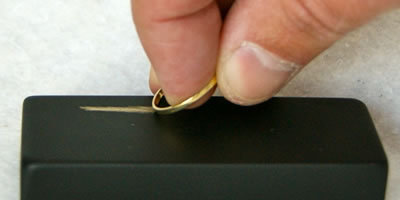
With a little practice, you can get a fairly nice streak of residue, and the light tone of gold really pops against the dark stone. Then, if somebody is trying to sell you a lot of precious metals, you can perform this streak test using them on your touchstone, and compare the streaking pattern against metals that you trust. If they're similar, the metal is pure, and if the streaks are different, the bastards probably aldulterated it with something cheaper. There you have it- a straightforward, fairly reliable, and very pre-modern method of rooting out Ea-Nasirtesting the quality of your precious metals during high-stakes trading. To this day, it's still a tool in any geologists' kit; you can see how it's handy for mineral identification when you're out in the field.
Anyway, the substance we now know as basalt was particularly good for this task, so (as humans will tend to do) the function of the stone and the type of stone itself started to get mixed up and share the same name. Greek contact with Egypt taught Europe the word, with the slight modification to basan, and then there was a typo in one of Pliny's books, so when they dusted it off in the Renaissance, it became Basalt instead. But it's all the same thing and the same word.
One of my favorite cul-de-sacs of this history is that at one point in ancient Greece, when the word was still more 'touchstone' than 'igneous rock', the word had expanded enough to take on some metaphorical and maybe mythic proportions. Basanos meant 'touchstone', yes, but also 'trial' or 'test' as applied to our own more human ambitions, a thing you endure to show your quality. So basalt became the stone that could find true gold among false metals- not just in the marketplace, but in the soul as well.
883 notes
·
View notes
Text
SPOILERS FOR BALDURS GATE 3 but I have to talk about this, I wheeze every time I think about it
Ok so I haven’t finished act 3 yet, so I am absolutely taking everything the Emperor says with a grain of salt, but the Emperor’s backstory is just so… breathtakingly funny to me, when compared to my other companions. Especially with how dramatically he was built up—your protector, your mysterious guardian, shielding his true identity because he could see no other choice, now forced to stand before you in his true form. The story itself practically had a flashing neon sign above his head screaming “This character is cool! This character is mysterious! Prepare yourself to receive the COOL and TRAGIC backstory that brought him to this place!”
And he. He was a hedge fund manager. Got that music and flashback sequence with the pained voice, “By night I devoured the brains of criminals. By day I controlled the mercantile groups of Baldurs Gate.” Like sir you invested in various businesses? Or did you like, establish and impose tax regulations upon local and foreign merchants? Because those are both neat, but like, my collection of demonic soldiers held against their will, abused servants/slaves seeking vengeance and Slightly Burdened Hippie Bear are not exactly overwhelmed by this backstory.
Emperor: Such was my influence, I came to be known as the Emperor within the shadows of Baldur’s Gate.
Tav: They… they started calling a business investor ‘the Emperor?’
Emperor: I was very good at business investment.
Tav: So our mysterious guardian was just a vigilante hedge fund manager—
Emperor: Time to talk about Prince Orpheus, immediately.
And then later you’re running through the city and you find his Super Secret Mysterious Hideout, and it’s just… some big tables covered in his notes, yes we will invest in this winery. No we will not invest in those cheeses. Someone is trying to traffic illegal goods here. Let’s create a hostile economic environment for this tavern. And it’s even funnier because he’s hanging out in your brain giving commentary the whole time about how dark and powerful he was, like bro. This is your office. This is the office in which you worked a 9-5 desk job. An executive desk job, granted, but very definitely a desk job.
Emperor: I controlled Baldurs Gate from that super fancy high-backed chair. No coin changed hands in the city without being approved at that giant dramatic table.
Tav: So board meetings.
Emperor: What?
Tav: That giant dramatic table is where you had board meetings.
Emperor: The Knights of the Shield decided what business could or could not take place—
Tav: Yes, a board meeting. You were the chairman of the board. It’s so funny that we have a hermit wizard and a vampire twink who embroiders his own underwear, but the nerdiest one has been hiding out in this magical D20 the whole time.
Emperor: … let’s talk about my mother’s silverware now.
434 notes
·
View notes